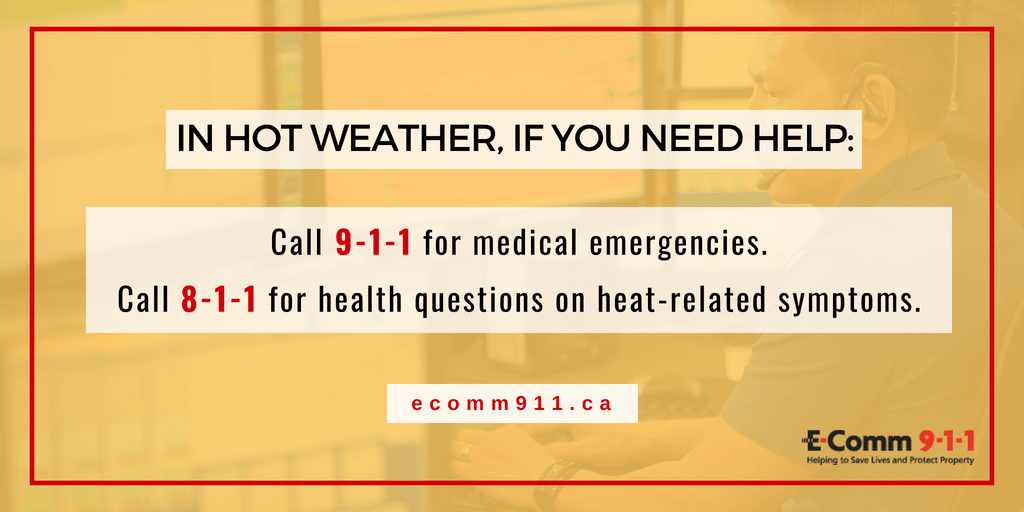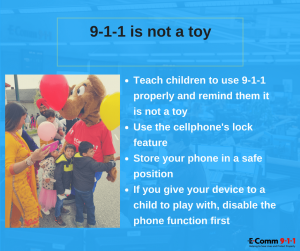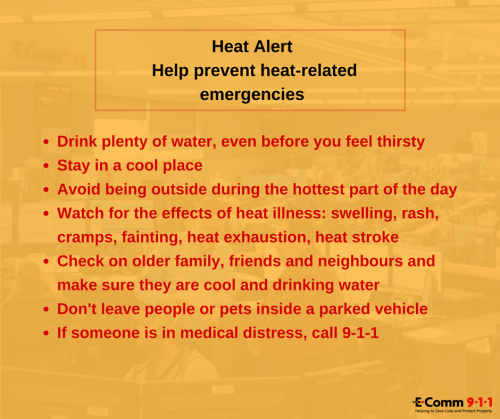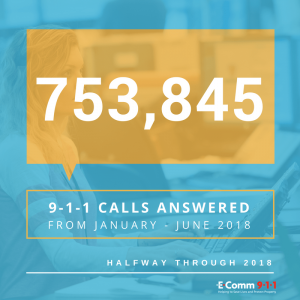 As hot weather continues in B.C., here is some advice from the Canadian Red Cross.
As hot weather continues in B.C., here is some advice from the Canadian Red Cross.
- Stay hydrated and cool
- Be prepared for power outages
- Check with your neighbours, friends and those at risk
More tips are available here.
The City of Vancouver also has a number of tips to help you deal with summer heat.
Check Environment Canada for the latest public weather alerts for B.C.
Tips for staying active in hot weather from
The summer is a good time to talk to children about the correct use of 9-1-1 and to remind them that 9-1-1 is not a toy. Here are some tips:
- Always keep cordless phones fully charged and in the same place in the home
- Keep your address information near the phone and show your children and caregivers where it is
- Never give old cellphones to children to use as toys—many de-commissioned phones can still dial 9-1-1
We have a range of education materials for kids. Visit our 9-1-1 education page for more information.
Heat-related emergencies happen when the body becomes dehydrated.
Anyone who stays in the summer heat and sun for too long may be affected by heat cramps, heat exhaustion or heat stroke.
According to the Canadian Red Cross, here are the signs and symptoms that can lead to heat-related emergencies:
- Cramps or muscle tightening, usually in the legs and abdomen, but they can be in other parts of the body
- Headache
- Nausea
- Dizziness, weakness, and feeling faint
- Skin that is redder or paler than usual, or moist skin
- Rapid shallow breathing
- Irritable, bizarre, or aggressive behaviour
If someone has been in the heat for too long and is suffering from the above signs and symptoms, move the person to a cooler location, give them cool water in sips and call 9-1-1 for help.

 From January to June 2018, we’ve answered 753,845 9-1-1 calls in B.C.
From January to June 2018, we’ve answered 753,845 9-1-1 calls in B.C.
- 98% of these calls were answered in 5 seconds or less
- 70% of the calls came from cell phones and 30% from landlines
- 66.4% of the calls received were for police, 5.2% for fire and 28.4% for ambulance
Our service level target is to answer 95 per cent of 9-1-1 calls in five seconds or less. The total number of 9-1-1 calls are for 26 regional districts and communities spanning from Vancouver Island to Alberta and from the U.S. borders to north of Prince George.
E-Comm is responsible for 92 per cent of the province’s 9-1-1 call volume with approximately 1.45 million 9-1-1 calls in 2017. Find out more about our 9-1-1 call statistics.
We also received five Text with 9-1-1 (T9-1-1) calls in July, for a total of 19 calls so far in 2018. T9-1-1 is a specialized texting service available for people who are Deaf/Deaf-Blind, Hard-of Hearing or Speech Impaired (DHHSI) that allows registered users to communicate with 9-1-1 call-takers through text. Find out more about T9-1-1.
We’ve published the spring 2018 edition of our quarterly newsletter and E-Comm’s 2017 Annual Report. Check out our publications page.
 As hot weather continues in B.C., here is some advice from the Canadian Red Cross.
As hot weather continues in B.C., here is some advice from the Canadian Red Cross.



 From January to June 2018, we’ve answered 753,845 9-1-1 calls in B.C.
From January to June 2018, we’ve answered 753,845 9-1-1 calls in B.C.